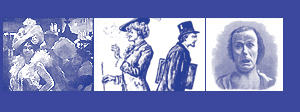Biographies
Max Nordau (1849 - 1923)
MAX NORDAU (1849-1923) was born in Budapest into an orthodox Jewish family. Work as a newspaper journalist took him to Germany and Paris, where he lived for the rest of his life, voluminously writing and practicing as a private physician. In 1896, after reporting on the Dreyfus trial which revealed widespread anti-Semitism in French institutions, Nordau began a lifelong campaign on behalf of the Zionist cause. In the style of his most famous book Degeneration, his support for a Jewish homeland focussed on hard work, duty, order, and will-power rather than mysticism and messianic heritage. Nordau wrote novels, short stories, plays, essays, and criticism, and his obituary in the London Times referred to him as ‘a writer of world fame’ (see George L. Mosse’s introduction to Nordau, Degeneration [London: Bison, 1993]: pp. viii-xxxvi). Degeneration, originally published in German in 1892 as Entartung and translated into English in 1895 - in time to become a kind of explanatory supplement to the trials of Oscar Wilde - has come to be interpreted as a reactionary’s guide to all that was ‘modern’ in the late-nineteenth century. Treated nowadays as a curious literary artefact, it is difficult to imagine the sensation the book created in 1895. According to Nordau, the speed of modernity and our disjointed and partial experience of it was predisposing us to perversity and morbidity. Life in large cities, and the pernicious effects of alcohol and tobacco, were giving rise to a physically and mentally degenerate population.
One of the most problematic influences on the increasingly decadent way of life, according to Nordau, were the forms of art he saw as being almost wilfully pathological. Accordingly, he attacks the morbid emotionalism of Romanticism and the pre-Raphaelites; the ‘overweening vanity and self-conceit’ (p. 101) of the French symbolist poets Verlaine and Mallarme; Tolstoy for his ‘mental aberration’ (p. 145); Wagner, to whom Nordau grants ‘a greater abundance of degeneration’ (p. 171) than all the other degenerates put together; Ibsen for his criticism of marriage and glorification of hysteria; the ‘senselessness’ (p. 452) of Nietzsche’s system of philosophy; Zola’s reliance on imagination over observation; and the Decadents’ ‘deification of filth’ (p. 415). Impressionism he dismisses as the result of ‘visual derangements’ (p. 27), and newly dissonant forms of music as ‘the jangle of a dozen voices’ (p. 13) which fails to conform to music’s main aim of ‘conterfeit[ing] religious devotion’ (p. 12).

